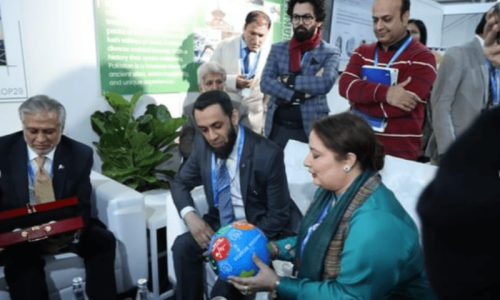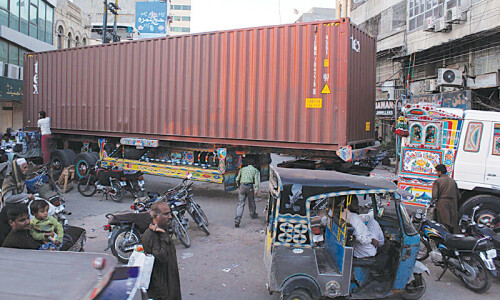AGAINST the backdrop of a significant upsurge in violent incidents in KP and Balochistan, which left around 100 people dead in just over a week, what appeared more important to large sections of the media was the statement of the spouse of a jailed popular political leader.
Editorial priorities of large swathes of the electronic media in particular seem to be decided not in the newsrooms but elsewhere and their news running orders reflect the mindset of those pulling the strings and WhatsApping TV ‘tickers’ to news executives that we see running on our screens verbatim.
News bulletins and tickers taken care of, the attention turns to friendly anchors, YouTubers and analysts whose primary task seems to be to echo the view and thinking of the security state, despite the inconvenient and often bloody truth slapping everyone in the face.
So, in a video message, when Bushra Bibi (and no, her words weren’t twisted, in this case at least, as some top PTI leaders have suggested) implied clearly that the Saudis were also instrumental in the removal of the PTI government in 2022, one could have taken her statement in a number of ways.
In recent years, Imran Khan has repeatedly said she is a ‘non-political’ personality who has nothing to do with politics. Taken at face value, her statement seemed to lend weight to that view. When she plucked out that particular accusation out of nowhere and went public with it, had she been a politician she would have been well aware of the consequences.
One must draw attention to perils old and new facing the country, and the rulers’ response to them.
But if she was merely being a desperate spouse who wants her husband’s more than year-long incarceration to end, then the only thing that would have mattered to her, in her view, would be to build and sustain pressure to secure his freedom. That it would achieve the opposite, ie, be counterproductive could only have occurred to a seasoned politician.
Despite the unease of several unnamed PTI leaders and their view that her statement had undermined, rather than provided an impetus to, the campaign to gather sufficient numbers of supporters in the streets of Punjab and KP so that those at the helm would be forced to take notice, it wasn’t immediately clear if her statement had impacted the plan at all.
If the protest is not postponed or cancelled, then Sunday (today) perhaps will make apparent whether her words were tantamount to a PTI own goal, as analysts, some among them apparently compromised, are suggesting or whether it had no such impact. You and I will have a fair idea by the time you read these lines.
Anyway, the purpose of this column was not to spend so much time on one statement and its coverage, but to draw attention to perils old and new facing the country, and the rulers’ response — which seems to leave a lot to be desired — to them.
Both Balochistan and KP have seen a rather alarming spike in violence that tragically seems to have made a home in the two provinces because of our policy failures and the incitement of our regional/ global adversaries.
Whether it is the ‘sectarian’ strife in Kurram or the Tehreek-e-Taliban Pakistan’s terror strikes on our security forces over swathes of the former tribal areas in KP or similar violence perpetrated by Baloch separatists in Balochistan from Quetta to the inner most recesses and the coastal belt of the province, which has drawn the blood of our brave soldiers, paramilitaries and civilians in their dozens, the main response is in words and not policy steps.
From the country’s chief executive to his backers to the smallest minion, we have been hearing — from the start — of the resolve to deal with the violence with an ‘iron hand’ and with other tools at the state’s disposal.
I wonder when this hand will come out of the foundry perfectly forged in order to deliver the deathly blow to those who kill our innocent civilians and soldiers alike. Side by side, we also wait for economic and political measures to tackle some of the causes that fuel this insane violence. Given the criticality of the state of play, one hopes this is soon.
But what does impede and dampen hope is the continued arrogance of the policymakers. This arrogance now threatens peace in Sindh too. It can’t be stressed enough that the federal government had no business approving Rs260 billion to construct canals from the Indus to irrigate large tracts of barren land in southern Punjab, the Cholistan desert included, where some five million acres of land have been allotted for ‘corporate farming’.
It is common knowledge who is driving this move but what is not clear at all is if anyone has thought through its consequences. Sindh is facing severe water shortages and being the lower riparian, its concerns should be addressed on a priority basis.
There just isn’t sufficient water in the Indus river system as is evident from the flows downstream of the Kotri barrage; even a visitor to the area can see the dry, sandy riverbed where once the mighty Indus flowed. The situation further downstream is even worse as the meagre flows mean the sea is pushing into the river and wreaking havoc on the area’s ecology.
The PPP has been rightly accused of dancing to the establishment’s tune but like it or hate it, it has so far stood between the nationalists and the state. If there is any attempt to ride roughshod over this issue, the buffer the PPP has provided will be wrenched away and a serious security crisis could envelop Sindh as well.
The writer is a former editor of Dawn.
Published in Dawn, November 24th, 2024















































